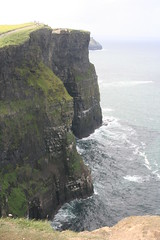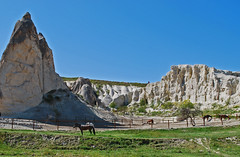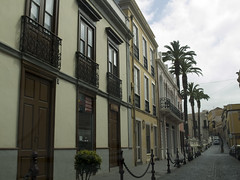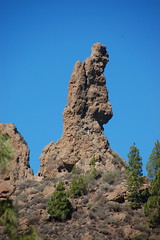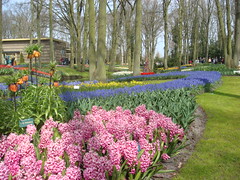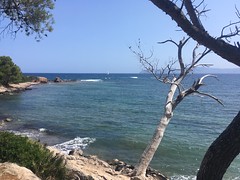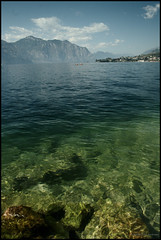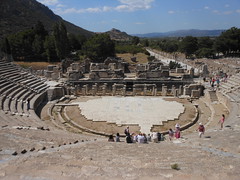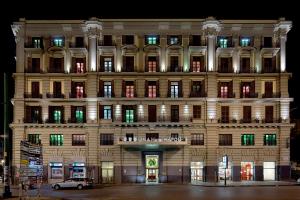Europe
Europe is a continent comprising the westernmost peninsulas of Eurasia, located entirely in the Northern Hemisphere and mostly in the Eastern Hemisphere. It shares the continental landmass of Afro-Eurasia with both Africa and Asia. It is bordered by the Arctic Ocean to the north, the Atlantic Ocean to the west, the Mediterranean Sea to the south, and Asia to the east. Europe is commonly considered to be separated from Asia by the watershed of the Ural Mountains, the Ural River, the Caspian Sea, the Greater Caucasus, the Black Sea and the waterways of the Turkish Straits.
Europe covers about , or 2% of Earth's surface (6.8% of land area), making it the second-smallest continent (using the seven-continent model). Politically, Europe is divided into about fifty sovereign states, of which Russia is the largest and most populous, spanning 39% of the continent and comprising 15% of its population. Europe had a total population of about million (about 10% of the world population) in . The European climate is largely affected by warm Atlantic currents that temper winters and summers on much of the continent, even at latitudes along which the climate in Asia and North America is severe. Further from the sea, seasonal differences are more noticeable than close to the coast.
European culture is the root of Western civilisation, which traces its lineage back to ancient Greece and ancient Rome. The fall of the Western Roman Empire in 476 CE and the related Migration Period marked the end of Europe's ancient history, and the beginning of the Middle Ages. Renaissance humanism, exploration, art, and science led to the modern era. Since the Age of Discovery, started by Spain and Portugal, Europe played a predominant role in global affairs. Between the 16th and 20th centuries, European powers colonised at various times the Americas, almost all of Africa and Oceania, and the majority of Asia.
The Age of Enlightenment, the subsequent French Revolution and the Napoleonic Wars shaped the continent culturally, politically and economically from the end of the 17th century until the first half of the 19th century. The Industrial Revolution, which began in Great Britain at the end of the 18th century, gave rise to radical economic, cultural and social change in Western Europe and eventually the wider world. Both world wars took place for the most part in Europe, contributing to a decline in Western European dominance in world affairs by the mid-20th century as the Soviet Union and the United States took prominence. During the Cold War, Europe was divided along the Iron Curtain between NATO in the West and the Warsaw Pact in the East, until the Revolutions of 1989, Fall of the Berlin Wall and the Dissolution of the Soviet Union.
In 1949, the Council of Europe was founded with the idea of unifying Europe to achieve common goals and prevent future wars. Further European integration by some states led to the formation of the European Union (EU), a separate political entity that lies between a confederation and a federation. The EU originated in Western Europe but has been expanding eastward since the fall of the Soviet Union in 1991. The currency of most countries of the European Union, the euro, is the most commonly used among Europeans; and the EU's Schengen Area abolishes border and immigration controls between most of its member states, and some non-member states. There exists a political movement favouring the evolution of the European Union into a single federation encompassing much of the continent.
Name
In classical Greek mythology, Europa was a Phoenician princess. One view is that her name derives from the Ancient Greek elements 'wide, broad', and (Genitive case) 'eye, face, countenance', hence their composite would mean 'wide-gazing' or 'broad of aspect'. Broad has been an epithet of Earth herself in the reconstructed Proto-Indo-European religion and the poetry devoted to it. An alternative view is that of Robert Beekes, who has argued in favour of a Pre-Indo-European origin for the name, explaining that a derivation from would yield a different toponym than Europa. Beekes has located toponyms related to that of Europa in the territory of ancient Greece, and localities such as that of Europos in ancient Macedonia.
There have been attempts to connect to a Semitic term for west, this being either Akkadian meaning 'to go down, set' (said of the sun) or Phoenician 'evening, west', which is at the origin of Arabic and Hebrew . Martin Litchfield West stated that "phonologically, the match between Europa's name and any form of the Semitic word is very poor", while Beekes considers a connection to Semitic languages improbable.
Most major world languages use words derived from or Europa to refer to the continent. Chinese, for example, uses the word (/), which is an abbreviation of the transliterated name (means "continent"); a similar Chinese-derived term 欧州 (Ōshū) is also sometimes used in Japanese such as in the Japanese name of the European Union, 欧州連合 (Ōshū Rengō), despite the katakana ヨーロッパ (Yōroppa) being more commonly used. In some Turkic languages, the originally Persian name ('land of the Franks') is used casually in referring to much of Europe, besides official names such as or .
Definition
Contemporary definition
The prevalent definition of Europe as a geographical term has been in use since the mid-19th century. Europe is taken to be bounded by large bodies of water to the north, west and south; Europe's limits to the east and north-east are usually taken to be the Ural Mountains, the Ural River, and the Caspian Sea; to the south-east, the Caucasus Mountains, the Black Sea, and the waterways connecting the Black Sea to the Mediterranean Sea.
Islands are generally grouped with the nearest continental landmass, hence Iceland is considered to be part of Europe, while the nearby island of Greenland is usually assigned to North America, although politically belonging to Denmark. Nevertheless, there are some exceptions based on sociopolitical and cultural differences. Cyprus is closest to Anatolia (or Asia Minor), but is considered part of Europe politically and it is a member state of the EU. Malta was considered an island of North-western Africa for centuries, but now it is considered to be part of Europe as well. "Europe", as used specifically in British English, may also refer to Continental Europe exclusively.
The term "continent" usually implies the physical geography of a large land mass completely or almost completely surrounded by water at its borders. Prior to the adoption of the current convention that includes mountain divides, the border between Europe and Asia had been redefined several times since its first conception in classical antiquity, but always as a series of rivers, seas and straits that were believed to extend an unknown distance east and north from the Mediterranean Sea without the inclusion of any mountain ranges. Cartographer Herman Moll suggested in 1715 Europe was bounded by a series of partly-joined waterways directed towards the Turkish straits, and the Irtysh River draining into the upper part of the Ob River and the Arctic Ocean. In contrast, the present eastern boundary of Europe partially adheres to the Ural and Caucasus Mountains, which is somewhat arbitrary and inconsistent compared to any clear-cut definition of the term "continent".
The current division of Eurasia into two continents now reflects East-West cultural, linguistic and ethnic differences which vary on a spectrum rather than with a sharp dividing line. The geographic border between Europe and Asia does not follow any state boundaries and now only follows a few bodies of water. Turkey is generally considered a transcontinental country divided entirely by water, while Russia and Kazakhstan are only partly divided by waterways. France, the Netherlands, Portugal and Spainare also transcontinental (or more properly, intercontinental, when oceans or large seas are involved) in that their main land areas are in Europe while pockets of their territories are located on other continents separated from Europe by large bodies of water. Spain, for example, has territories south of the Mediterranean Sea—namely, Ceuta and Melilla—which are parts of Africa and share a border with Morocco. According to the current convention, Georgia and Azerbaijan are transcontinental countries where waterways have been completely replaced by mountains as the divide between continents.
History of the concept
Early history
The first recorded usage of Eurṓpē as a geographic term is in the Homeric Hymn to Delian Apollo, in reference to the western shore of the Aegean Sea. As a name for a part of the known world, it is first used in the 6th century BCE by Anaximander and Hecataeus. Anaximander placed the boundary between Asia and Europe along the Phasis River (the modern Rioni River on the territory of Georgia) in the Caucasus, a convention still followed by Herodotus in the 5th century BCE. Herodotus mentioned that the world had been divided by unknown persons into three parts—Europe, Asia, and Libya (Africa)—with the Nile and the Phasis forming their boundaries—though he also states that some considered the River Don, rather than the Phasis, as the boundary between Europe and Asia. Europe's eastern frontier was defined in the 1st century by geographer Strabo at the River Don. The Book of Jubilees described the continents as the lands given by Noah to his three sons; Europe was defined as stretching from the Pillars of Hercules at the Strait of Gibraltar, separating it from Northwest Africa, to the Don, separating it from Asia.
The convention received by the Middle Ages and surviving into modern usage is that of t…
Hotels Europe
Looking for places related to Europe?
Those are other destinations to find places related to Europe:
 Germany
Germany Spain
Spain Italy
Italy France
France United Kingdom
United Kingdom Turkey
Turkey Poland
Poland Ukraine
Ukraine Greece
Greece Netherlands
Netherlands Switzerland
Switzerland Romania
Romania Austria
Austria Czech Republic
Czech Republic Hungary
Hungary Portugal
Portugal Norway
Norway Sweden
Sweden Slovakia
Slovakia Croatia
Croatia Bulgaria
Bulgaria Serbia
Serbia Belgium
Belgium Finland
Finland Denmark
Denmark Ireland
Ireland Belarus
Belarus Bosnia And Herzegov…
Bosnia And Herzegov… Lithuania
Lithuania Slovenia
Slovenia Latvia
Latvia Albania
Albania Iceland
Iceland Estonia
Estonia Macedonia
Macedonia Montenegro
Montenegro Cyprus
Cyprus Moldova
Moldova Kosovo
Kosovo Malta
Malta Luxembourg
Luxembourg Andorra
Andorra Svalbard
Svalbard Faroe Islands
Faroe Islands Monaco
Monaco Isle Of Man
Isle Of Man Jersey
Jersey Gibraltar
Gibraltar Liechtenstein
Liechtenstein Åland
Åland San Marino
San Marino Vatican City
Vatican City

